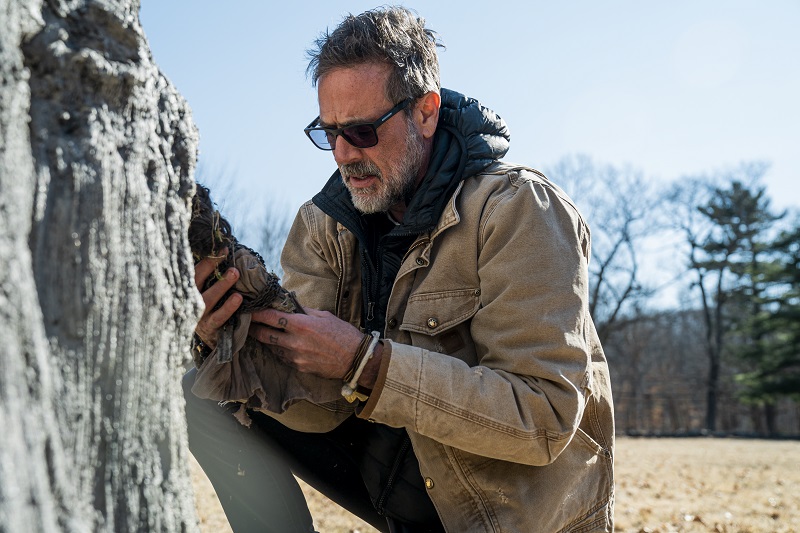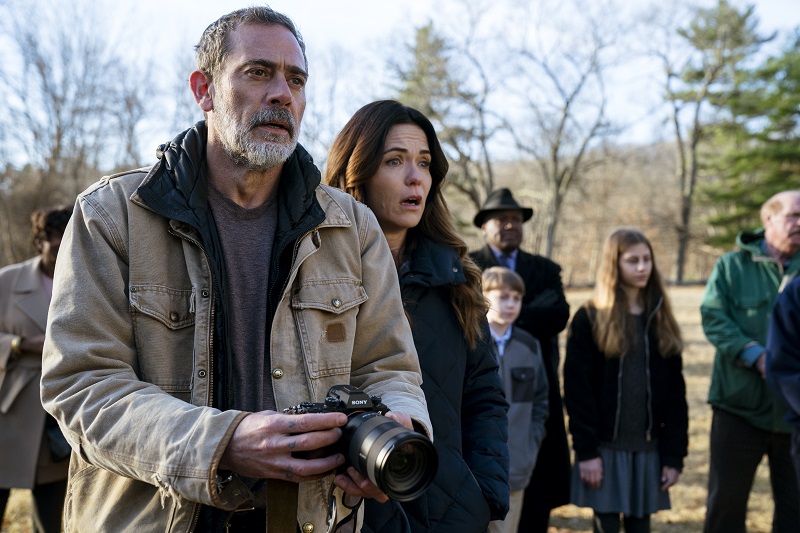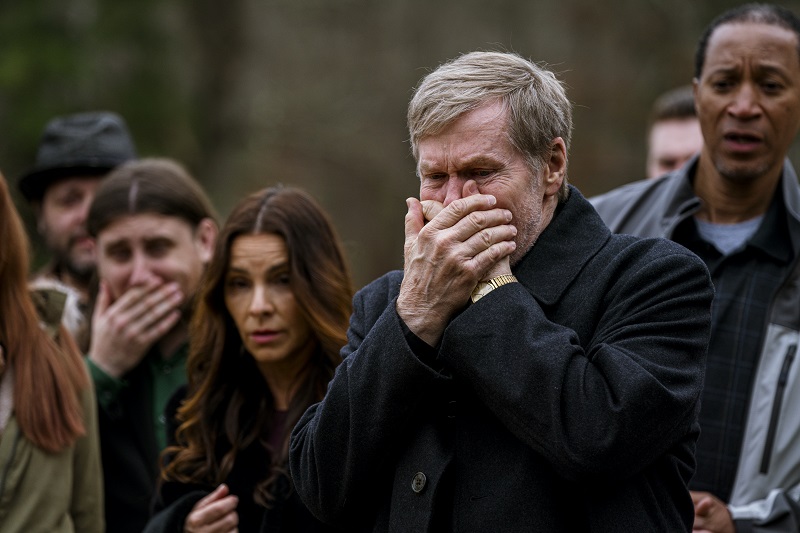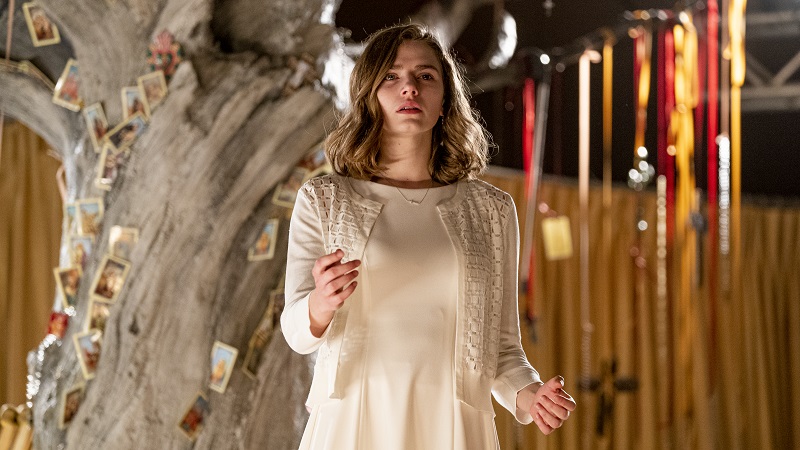Jeffrey Dean Morgan is a likable actor whose career is littered with flicks from every corner of the medium’s milieu. Most recently, audiences have gotten their fill of the veteran actor as the nefarious Negan on the TV stalwart, The Walking Dead. Morgan’s back on the big screen in The Unholy, out April 2, as a “journalist” caught in the midst of a holy war between G-d and the Devil that plays out in a classic New England small town in Massachusetts.

Some time ago, Morgan’s Gerry Fenn was quite the go-to guy for supernatural-centric stories that earned him top dollar from many of the world’s most trusted news sources. Then, the truth hit the fan when it was revealed that he made much of his sources up and now he takes low-hanging fruit tales from conspiracy-laden web-based sites and is living gig by gig.
Fate intervenes and he accepts an assignment that sends him to that tiny Massachusetts hamlet to investigate a satanic bovine branding. Instantly, he knows someone somewhere has some wool that has been pulled over his eyes. But a blindingly shiny object catches Fenn’s eye and he and everyone involved will never be the same. It’s a “crop” doll from the mid-nineteenth century that’s riddled with chains and a date stamp that says February 31. It probably has something to do with the film’s opening scene (wink, wink), and to salvage a story and a payday, Fenn breaks the doll and asks his caller to pose with it.
Later that night, as he is leaving town, he almost hits Alice (Cricket Brown) who is frozen in place, in the middle of the street, with her hands cupped towards the heavens—as if she is praying. The deaf and mute teenager may have been missed by Fenn’s Jeep, but something struck her because now she can hear and is talking like someone who majored in public speaking at an Ivy League college.
Suddenly, our discredited spiritual/supernatural journo has the story of the century on his hands. Soon after Alice’s miracle, she performs one involving a crippled young boy… who now walks. The Boston archdiocese sends Bishop Gyles (Cary Elwes), they’re taking this seriously. What’s fascinating is that Alice only seems to feel comfortable talking about what’s happening to her and why—not to mention intimate details about it—to Fenn.
The entire film bends, sways, and forges its claim on the possession genre of horror while hanging everything on the broad and gifted shoulders of its lead. Morgan navigates the character minefield that is Fenn with a commanding panache. Not only does he carry the narrative weight of the entire story, but he is our entry—our eyes and ears into this world, and it’s one that is changing rapidly while we’re in it.
Whether it horror movies, or simply a basic plot, if a writer can throw in a battle between the skeptic and the believer and back it up with action that validates both sides, then you really have something. Here, at first, the believer is Fenn, with Dr. Natalie Gates (Katie Aselton) serving the role of skeptic. She is a woman of science, but also as an active member of the catholic church at the center of our mystery. At one point, she gives Fenn a break, when he could have been arrested—which she points out, guiltlessly—and after that moment, the pair become closer and closer allies in this search for the truth.
Aselton (The Gift), as a person of science, brings something to the conversation that is a healthy shot in the arm of this story, just when it needed it. Her connection to Fenn is a fascinating thing to witness evolve as evolving events demand it.

Although Morgan is terrific, more on him in a moment, the film works or doesn’t work depending on whether Brown’s Alice is enigmatic enough to warrant all this attention, with its hauntingly raw reality lurking just around the corner. Father Hagan (Alice’s uncle and the priest who runs the church at the heart of our story) famously says, “When God sets up a tent here, look for the Devil to set up shop next door.”
Actor William Sadler portrays the weathered religious man grounded in New England tough stock and that works as a counterbalance to Alice and her sudden fame—not to mention how she once was deaf and now can car and once was silent and now can talk. Not only talk—but deliver miracles, born from the Virgin Mary herself… or so it seems.
Brown brings an innocence to the role, sure, but it is her unwavering commitment to the word faith and everything that means that has us wrapped around her little finger. The world is starting to descend on this Massachusetts hamlet because “Alice Saves.” As Brown portrays her, she is one part prophet, one part vessel, and all in control—she stresses to Fenn—every chance she gets. Does one protest too much?

Morgan plays grizzled better than anyone and that is exactly what is required of his Fenn. This is a man who has tasted the bright lights of the big city and when he is faced with being able to walk that path once again, the fate of the world may hang in the balance. Will he choose fame and fortune, or will he dig deeper and discover something about himself, as well as a long-standing “rural legend” that may hold the key to this entire endeavor? The answer will surprise you because, like life itself, it’s not black and white.

This idea that God and the Devil are in this never-ending death roll (yes, like an alligator) is a cinematically appealing vision and starting landscape for a faith-based horror flick.
Writer-director Evan Spiliotopoulos (he was a writer on Disney’s live-action Beauty and the Beast) smartly places that battle at the center of his New England-Puritan fight over faith tale that is The Unholy.
The storyteller has tapped the right actors and created the right roles for them, as well as giving them a simple—yet always threatening to go global—palette to play with, and along the way, they collectively have painted a fight for the soul of the flock (us humans) who always seems to be desperately searching for the right shepherd.
Grade: B

